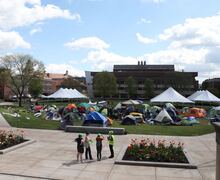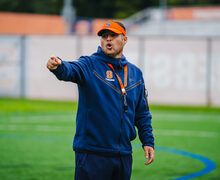Panel on Nazi war crimes trial hopes to see greater attendance than similar spring event
Organizers hope a second discussion on Nazi property seizure during World War II will draw more student attention after low turnout last April.
The lecture, titled ‘Hitler’s Seed Money and the Legal Struggle to Get It Back,’ will take place Friday from 4 p.m. to 6 p.m. in the Joyce Hergenhan Auditorium in Newhouse III. The discussion is free and open to the public and is co-sponsored by the Renee Crown University Honors and Judaic Studies programs.
The panel will focus on the effects of the landmark Nacher v. Dresdner Bank case, which charged Nazis of stealing money to fund their party, according to a Syracuse University news release. Lawyers and SU professors will participate in the discussion.
‘It’s an unknown aspect of World War II and the Holocaust,’ said Harvey Teres, director of the Judaic Studies Program. ‘Money to fund the Nazi effort came from property stolen from Jews.’
The case was the first to prosecute the Nazis for using illegally acquired private property to finance their efforts in World War II. The Nacher family held a large share in the German brewery, hotel and restaurant company Engelhardt Breweries, which was seized by Dresdner Bank in 1934, according to the news release.
Nacher v. Dresdner was filed in 1994 and has since spurred 56 related cases against German banks and corporations for similar reasons, according to the news release. The U.S. Department of the Treasury took control over all of the cases in 2000 and negotiated distributing a $5 billion settlement for compensation among every Holocaust survivor.
‘It’s a key part of our history,’ said Eric Holzwarth, deputy director of the honors program. Holzwarth said he considers Friday’s discussion a step toward turning a moral corner and making amends.
A similar event was held in April featuring Paul Kerson, lawyer for the Nacher family, but only about five people attended and most were professors, Teres said.
Kerson will return for Friday’s discussion, along with other Nacher family lawyers Marc Leavitt and Joseph Yamaner. Sebastian Schuetz, the Nacher family lawyer in Germany, and Ronnie Mandowsky, the executor of the Nacher Estate, will also contribute to the discussion, according to the news release.
This year’s event is expected to draw a much larger crowd. The SU Video Production Unit will make a video of the panel discussion and a reception will follow the panel. At least a dozen faculty members are preparing to participate in the discussion, said Samuel Gorovitz, event organizer and philosophy professor, in an e-mail.
Panel members have also been trying to increase awareness of the case by searching for filmmakers or an author to tell the story, Teres said.
Gorovitz said the event is a rare opportunity to hear about the case from the people directly involved.
Holzwarth said it is important for students to attend the panel and learn about the historic case.
‘Any student of history needs to attend,’ Holzwarth said. ‘It was an event of epic proportions.’
Published on November 3, 2010 at 12:00 pm
Contact Breanne: [email protected] | @bre_vann




